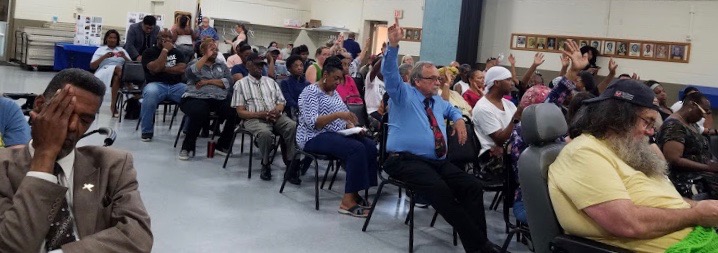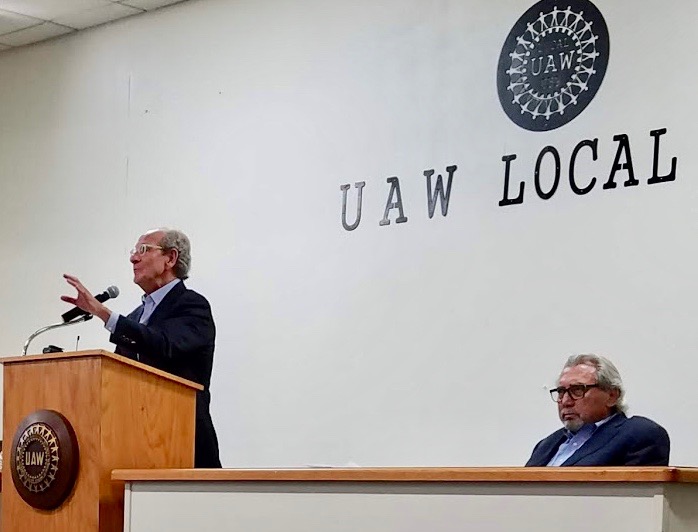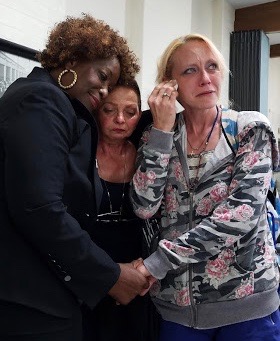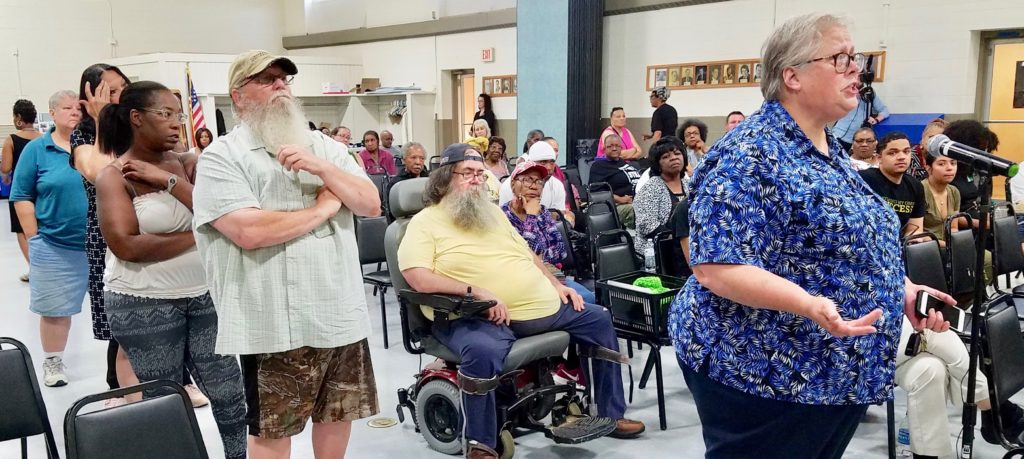
About 100 residents filled UAW Local 659 Thursday night to hear from water crisis civil case attorneys. (Photo by Tom Travis)
By Jan Worth-Nelson
Leading a call and response of “We won! They lost!” with a crowd of 100 vocal Flint residents at UAW Local 659 last night, Flint Water Class Action attorney Michael Pitt asserted that the numerous water crisis civil cases chugging through the courts are heading in the right direction.
“All avenues of escape have been cut off,” Pitt said of the arguments and unsuccessful attempts at dismissals by defendants from the State of Michigan, the EPA, and several engineering contractors including Veolia and Lockwood, Andrews and Newnam (LAN). “We have won every challenge that we have been faced with, and now the state is in a pickle.”
The choices are down to this, Pitt said, “Either settle the case or go to trial.”
Pitt is one of two attorneys appointed as “interim co-leads” to oversee the civil cases by U.S. District Court for Eastern Michigan Judge Judith Levy. Levy, based in Ann Arbor, has consolidated and is overseeing ten related Flint water crisis class action lawsuits.
Two dozen attorneys filled two rows at the front of the audience–some wearing black and white “Flint is Still Broken” teeshirts from the Democracy Defense League. Introducing them, moderator Flint attorney Trachelle Young said they were a “dream team” for Flint.
“We’re here because we spoke up,” she said, waking the world up to “a shock to the conscience” that was the pattern of “all kinds of bad actors” in the Flint debacle.
One attorney said the water crisis-related cases number in “the hundreds.”
“You walk into a case conference,” said civil rights attorney Julie Hurwitz, “and there are a hundred people there–and all of them are lawyers.”

Flint Water Class Action attorney Ted Leopold addresses the crowd; Co-leader Michael Pitt at right (Photo by Tom Travis)
Pitt urged the audience to withhold judgement from newly elected state Attorney General Dana Nessel, who has been lambasted locally for dismissing all pending prosecution cases against water crisis actors.
Nessel will address Flint residents at a panel on that subject tonight, at 6 p.m. in the same room — UAW Local 659 at 4549 Van Slyke Rd.
“Nessel inherited a mess,” Pitt said, noting that the state had paid legal fees for both the defendants and the costs of the prosecution–something he said never should have happened. He said when the cases are reopened, as Nessel has promised, the defendants should pay their own legal fees as they should have all along.
Ted Leopold, with Pitt a co-counsel appointed under Judge Levy, said “I see your teeshirts, I hear you say that Flint is still broken, but in high volume, I hear you say Flint Strong.”
“We could talk about how Flint is still broken, with its pipes, its illnesses, its bad water, but what is not broken is your spirit, your individualism, and making sure that what happened to you will never happen again.”
“We have won in every aspect of this litigation,” Leopold said, repeating Pitt’s themes, “And we won because justice always wins in the end.”
In addition to litigation processes, a current avenue being pursued is a settlement, he said–“to see if there are ways that can formulate a win-win for everybody.”
“We are only concerned about one win — that is the win for you and the citizens here in Flint,” Leopold said, adding, “We have to remember everybody here in Flint was harmed.
“We are going to assure as part of any settlement that everybody is treated equally, with parity,” he said. “There will be full parity in any settlement that is discussed.”
He said two mediators have been appointed to work on potential settlements: Pam Hartwood, a retired judge; and former U.S. Senator Carl Levin–an announcement that brought positive murmurs from the crowd.
He said both are highly respected, and that in particular, Levin “is working for you to get a full measure of justice, with complete parity, and everybody in Flint will recover–it’s the right thing to do–.” He emphasized every Flint resident might eventually benefit from a settlement.
Not all residents in the audience were in support of the settlement proposal, nor convinced by the promises of justice offered by the legal team.
“We’re not going to trust anybody until we see what they produce,” longtime activist Claire McClinton said after the event.
“We appreciate the attorneys and the support they’re giving us navigating the court system, we appreciate the scientists, the Christian community, the charitable community doing the job the government should be doing, and we appreciate our representatives speaking out in the hearings.
“But in the final analysis,” she asserted, “We the people will decide when justice is done. None of these support groups will tell us. We will say when justice is served. We’re the ones making that decision.”
Asked how they would know, McClinton said, “We will know” — just like, she said, the workers during the Sit-down Strike eventually knew when they had won.
Speaking earlier to the crowd from the podium, McClinton said, “We still have a toxic water problem, but more than that, we still have a democracy problem” triggered by the succession of emergency managers, one of whom was running the city when it switched from Detroit water to Flint River water in 2014.
Nonetheless, McClinton said, surveying the crowd and praising the efforts of the grassroots protestors, those who caused Flint’s problems “messed with the wrong city.”

Attorney Cynthia Lindsey comforts Christina Murphy and friend Virginia Murphy after Christina delivered an emotional and powerful plea for relief from water crisis tragedies. (Photo by Tom Travis)
A succession of residents during the public comments portion of the event reported ongoing physical problems and urged the attorneys to negotiate for full lifetime health care for Flint residents.
“We should be funded for the rest of our lives,” activist Art Woodson said. “They poisoned us. [Former governor] Snyder and his culprits are as bad as the terrorists. Can you promise us that you will negotiate on the medical part? ”
He noted many resources had been directed to children and the elderly, but that those “in the middle” often have been left out.
Pitt replied that Judge Levy is “tireless and brilliant” and “has to find a way to be equitable.”
Reflecting on how much time already has elapsed, Woodson said, “I don’t believe in handshakes — we need something in writing.” Pitt assured him that was part of the process.
Jeremy Orr, attorney from the National Resource Defense Council representing a crucial $97 million pipeline replacement settlement, faced a series of complaints–one from local activist Quincy Murphy about the end of bottled water supply for the city. Orr said though the bottled water deliveries stopped during implementation of the NRDC settlement, it was not part of the agreement. Kettering professor Laura Sullivan criticized the system of notifying and carrying out replacements, citing misleading mailings seeming to require “opt-in” for the work.
Orr stated there was no opt-in required and said the materials were being reworked to be more effective.

Residents lined up to question and comment: Laura Sullivan (right) followed by Tony Palladeno. “My integrity has been attacked” by an inefficient pipeline replacement process, Sullivan said.(Photo by Tom Travis)
He urged her and others to contact the Flint Water Class Action office at flintwaterclassaction.com. The team also has a Flint office on Robert T. Longway open 9-5 a.m. Monday and Thursday weekly.
Banner photo by Tom Travis
EVM Editor Jan Worth-Nelson can be reached at janworth1118@gmail.com. EVM Staff Writer Tom Travis contributed to this report.



You must be logged in to post a comment.